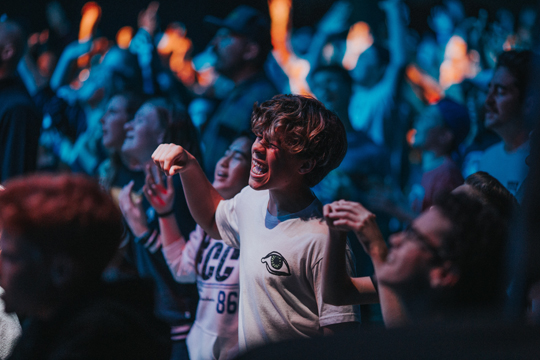Mass for the Masses
Freiburg, May 28, 2018
People come to events like the Catholic church conference in droves, yet attend Sunday services only in dribs and drabs. Should the church take an example from popular culture in order to gain a bigger following? Jürgen Reuß asked Prof. Dr. Stephan Wahle about it. The theologian is head of the Department of Liturgy, Music and Culture at the University of Freiburg. During the summer semester of 2018, he is offering a Lecture Series on Religion and Contemporary Popular Culture in cooperation with the Center for Popular Culture and Music (ZPKM).

Praising the Lord with passion: A church service in a Christian congregation in the USA. Photo: Vince Fleming/Unsplash
Mr. Wahle, when did the church notice that there is something called popular culture and that it could make sense to consider it?
Stephan Wahle: At the start of the 20th century, the focus of the liturgy moved away from the clerics and more towards all of the faithful joining in celebrating the mass. The breakthrough came with the Second Vatican Council (1962-1965), when opening high church culture to elements of popular piety and new forms of music became formalized as an important pastoral concern. Since then, the door to more diversity has opened up a crack and there was a paradigm shift in church music.
How can one conceive of such an opening?
Of course, religious life should, as in the past, still be characterized by the high church culture of celebrating the Eucharist, which is framed by varied forms of the mass and popular prayer. In terms of an opening, elements of popular culture can also be taken up within the celebration of the Eucharist, for example in church hymns or by using new media. Furthermore, they were already holding what are called „silent masses.“ These were said by priests without a choir and allowed a certain degree of liturgical freedom. The congregation here – parallel to recitation of the mass text – sings popular German hymns. A congregation joined in song was not decisive for the valid celebration of mass, yet it was important to the faithful and often more popular than having a full choir. Official recognition of the congregation singing developed gradually based on the demand and need to be included more musically. It is a development that the church cannot and will not isolate itself from.
Seen from a different perspective: Why should the church get involved in popular culture at all?
Theology must concentrate on more than just specific environments. It cannot perceive of itself as a science that is accessible only to an elite. If we are serious about the Gospel as something that should be available to all people, theology is then responsible for opening itself up and has the task of looking at what is going on in contemporary culture and why that is being expressed musically.

A plea for diversity: Stephan Wahle emphasizes that theology cannot perceive of itself as a science that is accessible only to an elite. Photo: Thomas Kunz
Are the days gone when the Rolling Stones’ music was classified as the „music of the devil?“
Admittedly, looking at why pop is so attractive was long considered a dubious exercise within the Catholic church. The readiness to change is relatively recent. In order to be able to analyze this phenomenon as a theologian, you have to be able to speak again first. It’s uncharted territory for us, which is why during this semester we are exploring it more in depth in cooperation with our colleagues from cultural studies.
Dioceses are setting up pop choirs. There’s even a Bachelor’s program called „Popular Protestant Church Music.“ Is that the road to the future?
There are choirs in the Archdiocese of Freiburg that sing classical and popular music. We need people to work within the church with children and youngsters who are trained above and beyond traditional choral works. Yet people should not be so naive as to replace biblical and liturgical texts with pop songs. The Holy Mass has a certain form, a certain dramatic composition and it’s not easy at all to simply integrate pop songs in it. But the whole issue can be placed in a dialogue. We should try to perceive without prejudice what people are trying to work out in popular culture and what’s being negotiated.
Can there be a dialogue if following the Bible is to own the truth and you are more dedicated to spreading the faith?
Theology is naturally the study of faith, and in the Christian faith, the Holy Scripture provides a foundation that isn’t so easy to push aside. But I am convinced that Bible stories contain in them things that are still central to our life today. I see my task as creating a productive tension between church rituals and worldly experience and to conceive of the liturgy as a third space in which communication between these two worlds takes place. Ideally, something new comes into being as a result.
Doesn’t the church need something more like a „Youtube-klickmonster,“ like Father Ray Kelly of Ireland, if the young people aren’t to desert the church´?
It was always more of an ideal than a reality for the whole family to get together in church on Sunday. We won’t change much by getting rid of „Gloria“ and replacing it with a pop hit. I’m more confident in the power of faith and ritual skills that are centuries old.
Lecture Series on "Religion and Contemporary Popular Culture"

